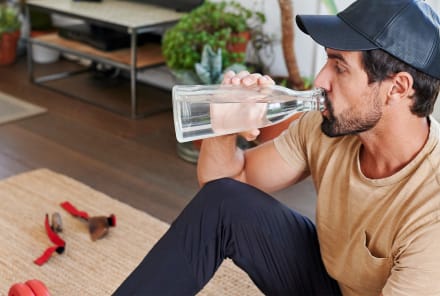Advertisement
Is This Health Metric The Key To Longevity, Resilience & Performance? From An HRV Expert


Imagine a single health metric that can predict how well your body handles stress, improves your performance, and is linked to a longer, healthier life. According to psychologist and biofeedback expert Leah Lagos, Psy.D., that metric exists—and it's called heart rate variability (HRV). In our conversation on the mindbodygreen podcast, Lagos dives deep into what HRV is, why it matters, and how you can optimize it for peak health and performance. Here's everything you need to know.
What is HRV, and why should you care?
HRV, or heart rate variability, measures the variation in time between each heartbeat. Specifically, it's the body's ability to manage stress effectively. Think of HRV as your body's agility—how quickly your heart can respond to challenges and return to baseline. A higher HRV means your heart is more efficient, with greater adaptability to stress. On the other hand, a lower HRV is linked to issues like anxiety, heart disease, and even asthma.
Wearables today measure heart rate waves during your inhale and exhale. When looking at your data, the goal is simple: You want those waves to be big. More variation means your heart and body are more resilient, helping you stay energized when you need to be and recover quickly when stress subsides.
What influences HRV
HRV is highly personalized, meaning several factors can influence it, including your biology—like a history of anxiety or heart conditions. The good news? According to Lagos, the key isn't having a perfect HRV but optimizing it within your personal range. By focusing on what works for you, you can create real, lasting improvements.
Start by identifying what Lagos calls "amplifiers" and "subtracters." Amplifiers are lifestyle habits that increase HRV, such as regular exercise, consistent sleep, or stress management practices like meditation. Subtracters are behaviors that decrease HRV, such as eating late, poor sleep, and drinking alcohol. Finding what boosts your HRV can make a big difference in your day-to-day well-being.
Breath your way to better HRV
Want to boost your HRV? Start with something you do every day—breathing! According to Lagos, breathwork is one of the most powerful tools to improve your HRV and take charge of your body's stress response. Think of it as a workout for your nervous system, helping you switch from "fight-or-flight" mode to a calm, cool, and collected state whenever you need it.
Lagos recommends starting by finding your personal "resonance." This is the breathing rhythm that feels effortless for you. Lagos suggests trying the 4-6 method—breathe in for four seconds, out for six, no pauses in between. Not only does this help you calm down in the moment, but over time it trains your body to handle stress better, activating your vagus nerve and making your heart, brain, and even gut function more efficiently.
HRV training isn't an overnight fix, though. It's a 10-week commitment, practicing your breathwork twice a day. But the payoff? You'll feel more in control of your body's stress response, with the added bonus of increased energy and resilience.
Benefits of higher HRV
So, why should you put in the effort to improve your HRV? A higher HRV is associated with numerous benefits, including:
- Live longer, feel better: Studies1 show that people with higher HRV tend to live longer and have better overall health.
- Bounce back faster: High HRV means you recover from stress 2quicker and handle life's challenges with more ease.
- Crush your goals: Whether it's at work, in the gym, or just in everyday life, high HRV boosts focus, recovery3, and mental clarity.
The takeaway
Ultimately, HRV is your body's secret weapon for resilience and longevity. While wearables can help guide you, don't stress about exact numbers—focus on trends and consistent improvement. With regular HRV training and lifestyle tweaks, you can take control of how your body responds to stress, increase your confidence, and feel more in tune with your health.
Watch Next
Enjoy some of our favorite clips from classes
Enjoy some of our favorite clips from classes
What Is Meditation?
Mindfulness/Spirituality | Light Watkins
Box Breathing
Mindfulness/Spirituality | Gwen Dittmar
What Breathwork Can Address
Mindfulness/Spirituality | Gwen Dittmar
The 8 Limbs of Yoga - What is Asana?
Yoga | Caley Alyssa
Two Standing Postures to Open Up Tight Hips
Yoga | Caley Alyssa
How Plants Can Optimize Athletic Performance
Nutrition | Rich Roll
What to Eat Before a Workout
Nutrition | Rich Roll
How Ayurveda Helps Us Navigate Modern Life
Nutrition | Sahara Rose
Messages About Love & Relationships
Love & Relationships | Esther Perel
Love Languages
Love & Relationships | Esther Perel
What Is Meditation?
Box Breathing
What Breathwork Can Address
The 8 Limbs of Yoga - What is Asana?
Two Standing Postures to Open Up Tight Hips
How Plants Can Optimize Athletic Performance
What to Eat Before a Workout
How Ayurveda Helps Us Navigate Modern Life
Messages About Love & Relationships
Love Languages
Advertisement

Yes, There's A Longevity Vitamin (& People Over 40 Need To Prioritize It)
Molly Knudsen, M.S., RDN

Study Investigates How Fasting Impacts Sleep, Hormone Health & More
Gretchen Lidicker, M.S.

Yes, There's A Longevity Vitamin (& People Over 40 Need To Prioritize It)
Molly Knudsen, M.S., RDN

Study Investigates How Fasting Impacts Sleep, Hormone Health & More
Gretchen Lidicker, M.S.

Yes, There's A Longevity Vitamin (& People Over 40 Need To Prioritize It)
Molly Knudsen, M.S., RDN

Study Investigates How Fasting Impacts Sleep, Hormone Health & More
Gretchen Lidicker, M.S.

Yes, There's A Longevity Vitamin (& People Over 40 Need To Prioritize It)
Molly Knudsen, M.S., RDN

Study Investigates How Fasting Impacts Sleep, Hormone Health & More
Gretchen Lidicker, M.S.














